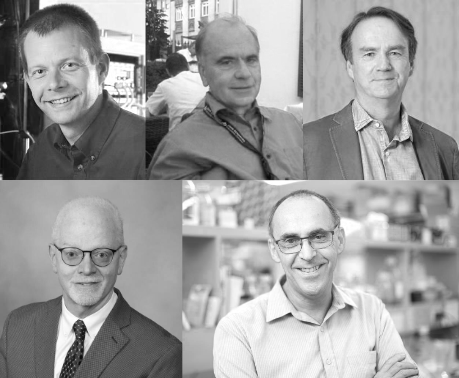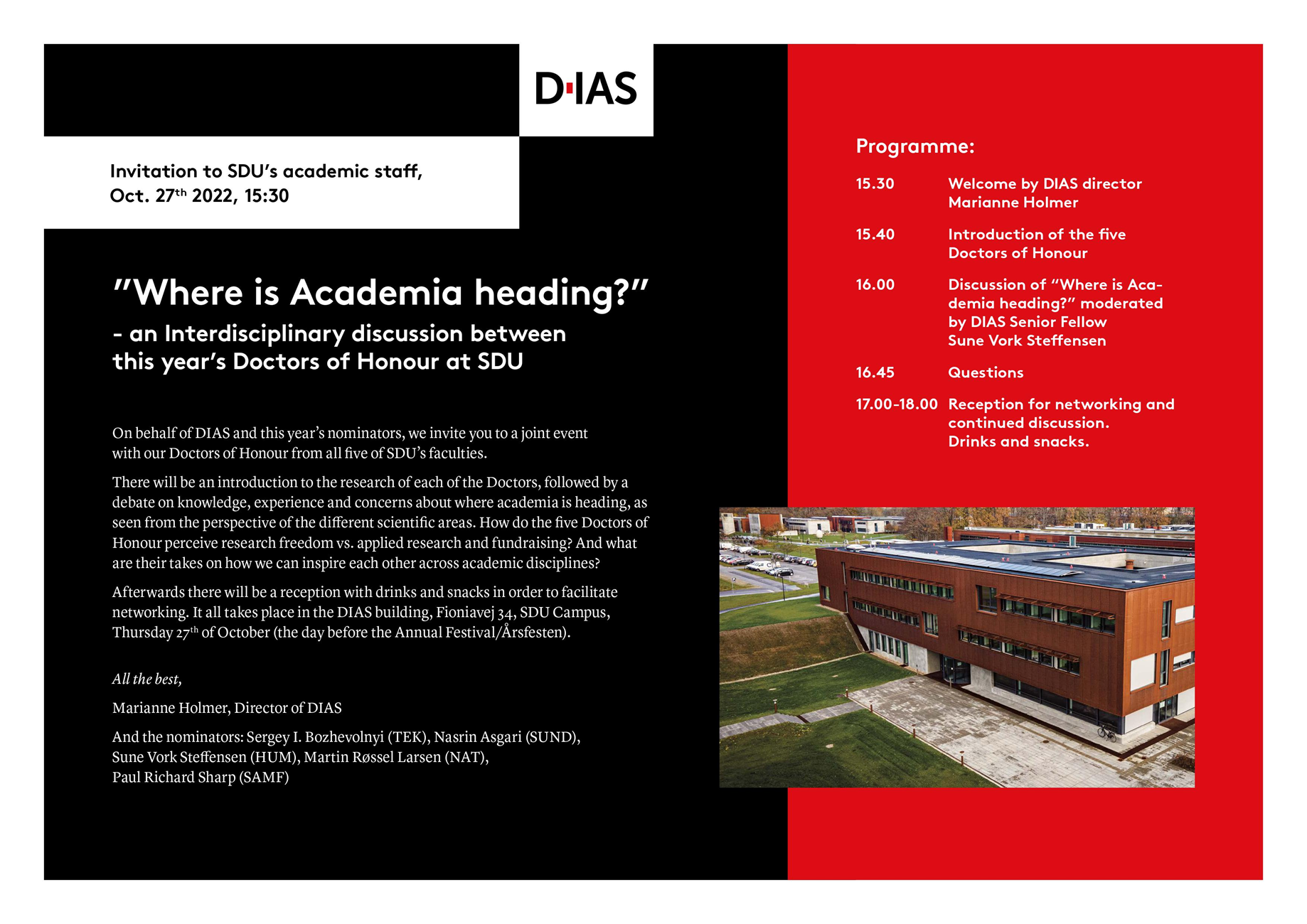
”Where is Academia heading?” - an Interdisciplinary discussion between this year’s Doctors of Honour at SDU
On behalf of DIAS and this year’s nominators, we invite you to a joint event with our Doctors of Honour from all five of SDU’s faculties.
There will be an introduction to the research of each of the Doctors, followed by a debate on knowledge, experience, and concerns about where academia is heading, as seen from the perspective of the different scientific areas. How do the five Doctors of Honour perceive research freedom vs. applied research and fundraising? And how can we inspire each other across academic disciplines?
Afterwards there will be a reception with drinks and snacks in order to facilitate networking. It all takes place in the DIAS building, Fioniavej 34, SDU Campus, Thursday 27th of October (the day before the Annual Festival/Årsfesten).
Programme:
15.30 Welcome by DIAS director Marianne Holmer
15.40 Introduction of the five Doctors of Honour
16.00 Discussion of “Where is Academia heading?” moderated by DIAS Chair Sune Vork Steffensen
16.45 Questions
17.00-18.00 Reception for networking and continued discussion. Drinks and snacks.
About this year's Doctors of Honour

Nominated by Professor Sergey I. Bozhevolnyi, Faculty of Engineering:
Mark Brongersma is a Professor in the Department of Materials Science and Engineering at Stanford University.
He received his PhD in Materials Science from the FOM Institute in Amsterdam. From 1998-2001 he was a postdoctoral research fellow at the California Institute of Technology. During this time, he coined the term “Plasmonics” for a new device technology that exploits the unique optical properties of nanoscale metallic structures to route and manipulate light at the nanoscale. His current research is directed towards the development and physical analysis of nanostructured materials that find application in nanoscale electronic and photonic devices. Brongersma received a National Science Foundation Career Award, the Walter J. Gores Award for Excellence in Teaching, the International Raymond and Beverly Sackler Prize in the Physical Sciences (Physics) for his work on plasmonics, and is a Fellow of the Optical Society of America, the SPIE, and the American Physical Society.
Read more here: https://profiles.stanford.edu/mark-brongersma and about Brongersma Group - Plasmonics and Photonics at Stanford University here: https://brongersma.stanford.edu/
Nominated by M.D. and Professor Nasrin Asgari, Faculty of Health Sciences:
Brian G. Weinshenker, M.D., Emeritus, Department of Neurology, Professor of Neurology at Mayo Clinic.
Listed, Highly Cited Researchers, Clarviate Analytics, 2016, 2017. Editorial board member, Neurology, 2014-2017. Listed, The World's Most Influential Scientific Minds, Thomson Reuters, 2014, 2015. Editorial board member, Multiple Sclerosis Journal, 2008-2013. Recipient, John Dystel Prize for Multiple Sclerosis Research, American Academy of Neurology and the National Multiple Sclerosis Society, Annual Meeting of the American Academy of Neurology, Honolulu, Hawaii, 2011.
Focus areas: Fulminant demyelination and neuromyelitis optica (NMO), Multiple sclerosis (MS), Rescue treatments for attacks of MS, McArdle's sign.
Read more here: https://www.mayo.edu/research/faculty/weinshenker-brian-g-m-d/bio-00084857
Nominated by Professor Sune Vork Steffensen and Associate Professor Sarah Bro Trasmundi, Faculty of Humanities:
Per Linell took his Ph.D. degree in general linguistics (Uppsala, 1974) and is Emeritus Professor of Language and Culture at Linköping University. He was professor of Communication Studies in Linköping from 1981 to 2005, and then in Language and Culture up to 2011. During the years 2005-2010 he was "distinguished researcher" at the Swedish Research Council. He is now Senior Professor in the Department of Education, Communication and Learning at Göteborg University.
Per Linell's research profile is distinctly interdisciplinary. He has specialized in two broad and related fields, general dialogical theory of human sense-making, in communication, thinking and action (Linell, 2009), and institutional communicative activities, in contexts such as legal, healthcare and educational institutions and professions (Linell, 2011). He has also contributed to various fields of linguistics, including phonology and the grammar of conversational language. He wrote an influential monograph on the dominant written-language-based perspective in the language sciences, and its dialogical alternatives (Linell, 2005). "Dialogical" theories oppose extreme individualism in psychology and linguistics and stress the interdependences between individuals and "others" (other individuals, groups, generalized others, cultures, artefacts, etc.). This overlaps with, among other approaches, socio-cultural theories of knowing, thinking, languaging and coping with the world.
Read more here: https://lincs.gu.se/members/per-linell
Nominated by Professor Martin Røssel Larsen, Faculty of Science:
Phillip Robinson, Professor of the Faculty of Medicine, University of Sydney; Professor of Chemistry, The University of Newcastle. Head of the Cell Signalling Unit at Children’s Medical Research Institute (CMRI), an NHMRC Senior Principal Research Fellow, and Co-Director of ProCan. Professor Robinson has received several awards during his career including the AW Campbell Award for Excellence in Neuroscience from the Australian Neuroscience Society and the Amersham Pharmacia Biotechnology Medal from the Australian Society for Biochemistry and Molecular Biology.
Professor Robinson was chair of the Fellowships Committee of the NHMRC for three years and is also a member of the Research Committee and the Training and Awards Committee. He is on the editorial board of a number of journals, including the Journal of Biological Chemistry. Professor Robinson and his team have made major contributions to understanding aspects of regulating nerve cell communication, principally the process of endocytosis and the protein dynamin, which along with other nerve terminal proteins, remains the focus of the research.
Read more here: https://www.cmrijeansforgenes.org.au/researchers/phil-robinson Read more about CMRI here: https://www.cmrijeansforgenes.org.au/research/research-teams/cell-signalling
Nominated by Professor Paul Sharp, Faculty of Business and Social Sciences:
Kevin O’Rourke is a Professor of Economics at NYU Abu Dhabi. He was previously the Chichele Professor of Economic History at the University of Oxford and a Fellow of All Souls College. He is a Member of the Royal Irish Academy, a Fellow of the British Academy, and a former Research Director of CEPR.
He has served the economic history profession in a wide variety of capacities, including terms spent as President of the European Historical Economics Society and Editor of the European Review of Economic History. He received his PhD in Economics at Harvard in 1989 and has taught at Columbia, University College Dublin, Harvard, Sciences Po Paris, and Trinity College Dublin.
His research lies at the intersection of economic history and international economics. He has published extensively on the history of globalization and deglobalization: his books include the prize-winning Globalization and History (co-authored with Jeffrey Williamson), and Power and Plenty: Trade, War and the World Economy in the Second Millennium (co-authored with Ronald Findlay). He was awarded an ERC Advanced Investigator in 2009 to study interwar trade and trade policy. His most recent book is Une Histoire Brève du Brexit (Odile Jacob, 2018), published in English as A Short History of Brexit: From Brentry to Backstop (Penguin, 2019).
Read more: https://nyuad.nyu.edu/en/academics/divisions/social-science/faculty/kevin-o-rourke.html
